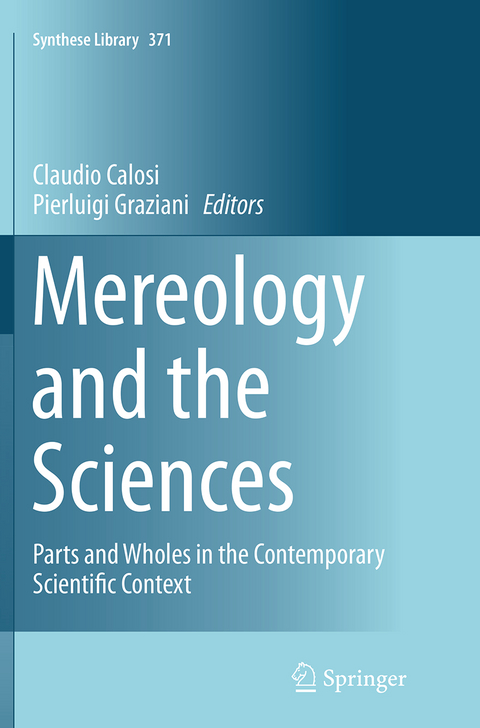
Mereology and the Sciences
Springer International Publishing (Verlag)
978-3-319-35793-5 (ISBN)
This volume is the first systematic and thorough attempt to investigate the relation and the possible applications of mereology to contemporary science. It gathers contributions from leading scholars in the field and covers a wide range of scientific theories and practices such as physics, mathematics, chemistry, biology, computer science and engineering. Throughout the volume, a variety of foundational issues are investigated both from the formal and the empirical point of view.
The first section looks at the topic as it applies to physics. The section addresses questions of persistence and composition within quantum and relativistic physics and concludes by scrutinizing the possibility to capture continuity of motion as described by our best physical theories within gunky space times.
The second part tackles mathematics and shows how to provide a foundation for point-free geometry of space switching to fuzzy-logic. The relation between mereological sums and set-theoretic suprema is investigated and issues about different mereological perspectives such as classical and natural Mereology are thoroughly discussed.
The third section in the volume looks at natural science. Several questions from biology, medicine and chemistry are investigated. From the perspective of biology, there is an attempt to provide axioms for inferring statements about part hood between two biological entities from statements about their spatial relation. From the perspective of chemistry, it is argued that classical mereological frameworks are not adequate to capture the practices of chemistry in that they consider neither temporal nor modal parameters.
The final part introduces computer science and engineering. A new formal mereological framework in which an indeterminate relation of part hood is taken as a primitive notion is constructed and then applied to a wide variety of disciplines from robotics to knowledge engineering. A formal framework for discretemereotopology and its applications is developed and finally, the importance of mereology for the relatively new science of domain engineering is also discussed.
Claudio Calosi is currently a post-doc at University of Urbino. He has been Visiting Research Scholar at University of Pittsburgh, University of California at Irvine and New York University. His main research interests are philosophy of science and analytic metaphysics and he has published extensively on both in journals such as Synthese, Foundations of Physics, Topoi to mention a few.Pierluigi Graziani received his Ph.D from University of Rome La Sapienza and is currently a post-doc at University of Urbino. His works spans from mathematical logic, especially proof theory, to history and philosophy of mathematics. He has been editor of different volumes and published in different distinguished journals.
Notes on Contributors.- Introduction: Parts, Wholes and Contemporary Sciences; C. Calosi and P. Graziani.- Part I. Physics.- Introduction to Part I: Mereology and Physics.- Building Enduring Objects out of Spacetime; C. Gilmore.- Relativistic Parts and Places: a Note on Corner Slices and Shrinking Chairs; Y. Balashov.- Parthood and Composition in Quantum Mechanics; C. Calosi and G. Tarozzi.- Continuity of motion in Whitehead's Geometrical Space; V. Fano and P. Graziani.- Part II. Mathematics.- Introduction to Part II: Mereology and Mathematics.- Multi-valued Logic for a Point Free Foundation of Geometry; C. Coppola and G. Gerla.- The Relations of Supremum and Mereological Sum in Partially Ordered Sets; R. Gruszynski and A. Pietruszczak.- Natural Mereology and Classical Mereology; P. Hovda.- Part III. Natural Sciences.- Introduction to Part III: Mereology and Natural Science.- Crisp islands in vague seas. Cases of determinate parthood relations in biological objects; L. Jansen, S. Schulz.- Developing the Mereology of Chemistry; J. P. Llored and R. Harrè.- Part IV. Computer Sciences and Engineering.- Introduction to Part IV: Mereology, Computer Sciences and Engineering.- Mereology in Engineering and Computer Sciences; L. Polkowski.- Discrete Mereotopology; A. Galton.- A Role for Mereology in Domain Science and Engineering; D. Bjørner.
| Erscheinungsdatum | 23.09.2016 |
|---|---|
| Reihe/Serie | Synthese Library |
| Zusatzinfo | XX, 378 p. 161 illus. |
| Verlagsort | Cham |
| Sprache | englisch |
| Maße | 155 x 235 mm |
| Themenwelt | Geisteswissenschaften ► Philosophie ► Allgemeines / Lexika |
| Geisteswissenschaften ► Philosophie ► Erkenntnistheorie / Wissenschaftstheorie | |
| Mathematik / Informatik ► Informatik ► Theorie / Studium | |
| Mathematik / Informatik ► Mathematik ► Logik / Mengenlehre | |
| Schlagworte | Epistemology • Formal and Material Ontology • Mathematical Foundations • Mathematical Logic • Mathematical logic and formal languages • Mathematical Logic and Foundations • Mathematical theory of computation • Mereology and Biology • Mereology and Chemistry • Mereology and Engineering • Mereology and Mathematics • Mereology and Physics • Mereology in Computer Science • Metaphysics of Science • Philosophical Foundations of Science • Philosophy • Philosophy: epistemology and theory of knowledge • Religion and Philosophy |
| ISBN-10 | 3-319-35793-X / 331935793X |
| ISBN-13 | 978-3-319-35793-5 / 9783319357935 |
| Zustand | Neuware |
| Haben Sie eine Frage zum Produkt? |
aus dem Bereich


